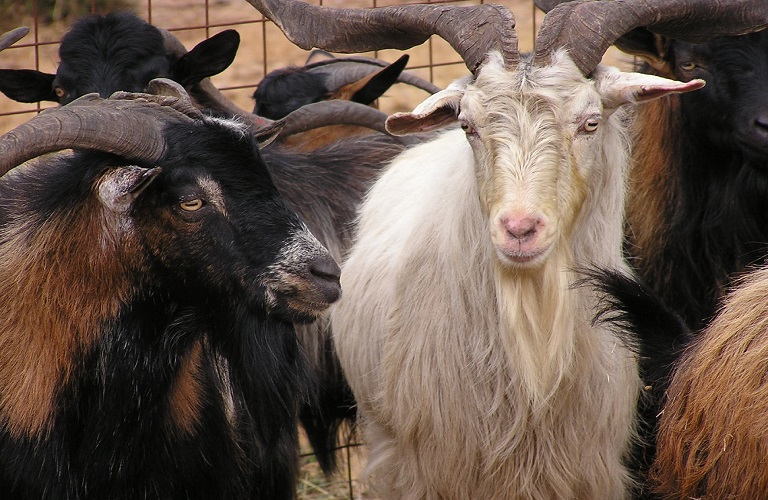
For the first time in Greece, an effort is underway to certify the milk produced by Greek goat breeds, with the aim of producing correspondingly certified dairy products.
In Greece today there are five million goats, meaning Greece is first place among EU countries in terms of goat numbers. This was one of the reasons for the initiation of the cooperation of the Institute of Veterinary Research of Thessaloniki at Agricultural organization Dimitra with the Animal Science Laboratory of the Aristotle University of Thessaloniki and with local firms, within the framework of the Graega Cheese project, with the aim of decoding the genome of six Greek goat breeds and the certification of their milk and the derived quality dairy products.
Read also – Agno milk again on supermarket shelves: Sarantis brothers’ plans for the factory
Blood and milk samples have already been collected from 327 animals on 19 farms and the samples will then be analyzed. Samples have been taken from the domestic goat, the black goat of Halkidiki as well as the goats of Skopelos, Pangaio, Serres Aridaia and also from the foreign species Anglonubia, Murtia and Damascus, so that the identification and differentiation of the samples can be done.
Ioannis Sakaridis, veterinarian, researcher at the Veterinary Research Institute of Thessaloniki at ELGO Dimitra noted that the aim is to determine a molecular method, using DNA techniques, to differentiate the milk from foreign goat breeds in relation to Greek goat breeds. The full genome of Greek breeds will be sequenced to determine which parts of the genome are related between the Greek breeds and how they are separated in relation to the foreign breeds of goats that exist in Greece. Thus, a traceability standard will emerge, through which the farms with Greek goat breeds will receive the relevant certification, which will follow the milk throughout the production line of any product.
In addition, the Graega Cheese project, named after GR, meaning Greece, and aega, meaning ‘goat’, will develop a chemical method to detect milk adulteration. In this way, exogenous sugars or proteins added to milk and water will be detected to detect any adulteration.
Latest News

WTTC: Travel & Tourism to Create 4.5M New Jobs in EU by 2035
This year, international visitor spending is set to reach 573 billion euros, up by more than 11% year-on-year

IMF: US Tariffs Shake Global Economy, Outlook Downbeat
IMF slashes global growth forecast to 2.8% as U.S. tariffs create uncertainty and ‘negative supply shock

First Step Towards New Audiovisual Industry Hub in Drama
The project is set to contribute to the further development of Greece’s film industry and establish Drama as an audiovisual hub in the region

Airbnb Greece – Initial CoS Ruling Deems Tax Circular Unlawful
The case reached the Council of State following annulment applications filed by the Panhellenic Federation of Property Owners (POMIDA)

Mitsotakis Unveils €1 Billion Plan for Housing, Pensioners, Public investments
Greek Prime Minister Kyriakos Mitsotakis has announced a new set of economic support measures, worth 1 billion euros, aiming to provide financial relief to citizens.

Alter Ego Ventures Invests in Pioneering Gaming Company ‘Couch Heroes’
Alter Ego Ventures' participation in the share capital of Couch Heroes marks yet another investment by the Alter Ego Media Group in innovative companies with a focus on technology.

Corruption Still Plagues Greece’s Driving Tests
While traffic accidents continue to claim lives on Greek roads daily, irregularities and under-the-table dealings in the training and testing of new drivers remain disturbingly widespread

Pope Francis Died of Stroke and Heart Failure Vatican Confirms
As news of the official cause of death spread, tributes poured in from across the globe. The 1.4 billion-member Catholic Church is united in grief, remembering a pope who championed inclusion, justice, and compassion

Increase in Both Museum Visits, Revenues for 2024
As expected, the Acropolis was the top archeological site in the country, followed by Sounion, Mycenae, the ancient theater of Epidaurus, and Vergina in northern Greece

Where Greece’s Tourists Come From: A Look at 2025’s Top Visitor Markets
The United Kingdom continues to hold the top spot as the largest source of incoming tourism, with 5.6 million seats booked for Greece this summer — up 2.2% from last year. This accounts for 20% of all international air traffic to Greece
















![Ξενοδοχεία: Μεγάλο το ενδιαφέρον για επενδύσεις στην Ελλάδα – Η θέση της Αθήνας [γραφήματα]](https://www.ot.gr/wp-content/uploads/2025/03/Athens-hotels-90x90.jpg)
























 Αριθμός Πιστοποίησης
Αριθμός Πιστοποίησης